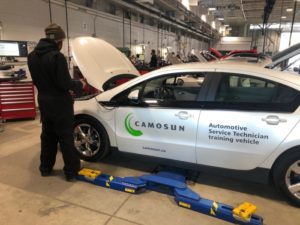The stereotypical images of a mechanic—someone down underneath a car, hands greasy with oil—are outdated, says Camosun automotive technician program leader Patrick Jones, and they’ve been changing for the better part of a decade. And the college is changing accordingly: in the fall, Camosun will offer a 36-hour electric vehicle (EV) maintenance pilot course (to be taken by “a small number of selected technicians,” says Jones), with a full version expected next year.
The Electric Vehicle Maintenance Training program was made possible by $440,000 that the provincial government gave to three institutions through their CleanBC Go Electric program. The funds were split between Camosun, the British Columbia Institute of Technology, and the College of New Caledonia. The roughly $110,000 of that funding that Camosun received will go toward items like EVs and tools and will also cover the costs of the tuition-free pilot portion of the course.

“Mechanics, over the years, or automotive service technicians, they’ve moved with the times as things have changed,” says Jones. “We ended up moving into automatic transmissions and fuel injections… Essentially, the vehicles we’re seeing on the road now, regardless of the power train in them, they’re basically like rolling computers.”
Jones says that you could even call automotive technicians IT workers: they diagnose problems, and as cars get more and more computerized, that has begun to change the work of what automotive technicians do. Jones says many people still think the old way is the current reality.
“That computer controlling is very complex,” he says. “Technicians have come to the plate, as always, and have learned how to deal with the computer controlling of vehicles.”
Jones expects the same thing will be true for the EV industry. As more and more technicians are trained in it, more and more technicians are comfortable with it, he says, adding that EVs are different in a lot of ways from regular cars, but similar in others.
“There’s no air filters, no fuel filters to deal with from a maintenance standpoint, but other maintenance things: windshield wipers, washer fluid, coolant—that’s really kind of similar to regular cars,” says Jones.
There’s currently no mandatory certification for automotive mechanics in BC. Under the Zero Emission Vehicle Act, which passed on May 30, 2019, all new, light-duty vehicles sold in BC must be zero emission by 2040, with 10 percent being zero emission by 2025.

